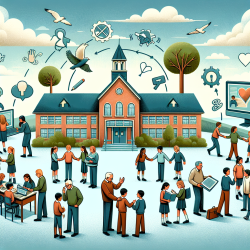Introduction
The COVID-19 pandemic has profoundly impacted our lives, reshaping how we interact with our environment. A recent study, "The Importance of Urban Natural Areas and Urban Ecosystem Services During the COVID-19 Pandemic," highlights the critical role these spaces play in enhancing mental and physical well-being. As practitioners in speech-language pathology, understanding the benefits of urban natural areas can enhance our therapeutic approaches, particularly in online settings like those provided by TinyEYE.
The Power of Urban Natural Areas
Urban and peri-urban natural areas offer a myriad of benefits, collectively known as ecosystem services. These include both material and non-material benefits, such as recreation, aesthetic experiences, and cultural heritage. During the COVID-19 pandemic, access to these areas became increasingly important for individuals seeking solace and stress relief amid global uncertainty.
Key Findings from the Research
- 69% of respondents increased their visits to natural areas during the pandemic.
- 80.6% reported that the importance of these areas increased significantly.
- 25.8% of first-time or infrequent visitors found access to these areas 'very important'.
- Activities such as exercise, birding, and stress reduction were commonly cited benefits.
These findings underscore the heightened demand for urban natural areas during crises, suggesting a need for continued investment in and access to these spaces.
Implications for Speech-Language Pathologists
For practitioners, integrating the benefits of nature into therapy can be transformative. Here's how:
- Promote Outdoor Activities: Encourage clients to engage in outdoor activities that enhance speech and language skills, such as storytelling or descriptive exercises in natural settings.
- Incorporate Nature into Therapy: Use nature-themed materials and virtual backgrounds in online sessions to create a calming environment.
- Advocate for Access: Support policies that improve access to urban natural areas, recognizing their role in mental health and community well-being.
Encouraging Further Research
The study highlights the need for further exploration into how urban natural areas can support therapeutic outcomes. Speech-language pathologists can contribute by:
- Conducting research on the impact of nature-based interventions on communication skills.
- Collaborating with environmental scientists to understand the broader health benefits of ecosystem services.
- Sharing findings with the community to advocate for the preservation and enhancement of natural areas.
Conclusion
As we navigate the challenges of the pandemic, the importance of urban natural areas becomes increasingly evident. By integrating these insights into our practice, we can enhance therapeutic outcomes and contribute to the well-being of our clients and communities. To read the original research paper, please follow this link: The importance of urban natural areas and urban ecosystem services during the COVID-19 pandemic.










